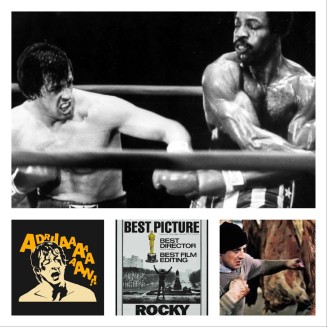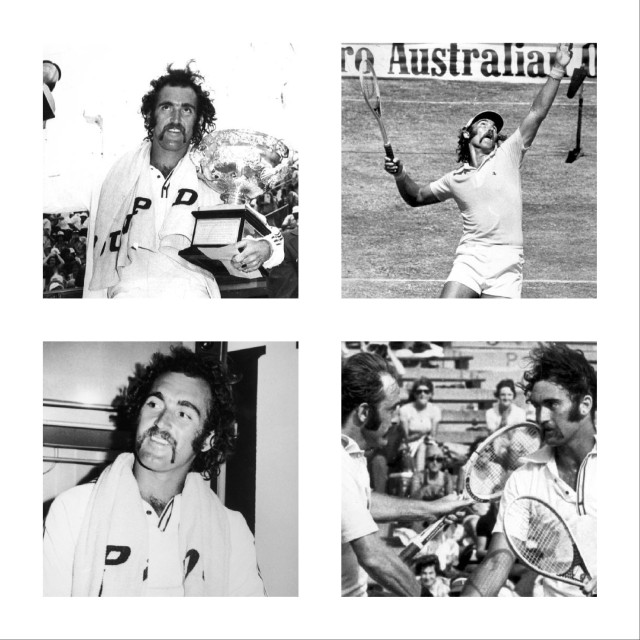Ah come on, Adrian, it’s true. I was nobody. But that don’t matter either, you know? ‘Cause I was thinkin’, it really don’t matter if I lose this fight. It really don’t matter if this guy opens my head, either. ‘Cause all I wanna do is go the distance. Nobody’s ever gone the distance with Creed, and if I can go that distance, you see, and that bell rings and I’m still standin’, I’m gonna know for the first time in my life, see, that I weren’t just another bum from the neighborhood. – Rocky Balboa
Forty-two years ago last week a little movie, made on a shoestring budget with an unknown star, was released upon a public unaware of the lasting cultural impact it would have. Rocky, Sylvester Stallone’s tale of a ‘never been’ boxer given a one in a million shot at his dream is the underdog movie all subsequent underdog movies try to emulate. While in my mind the greatest sporting movie ever made, it is more than just a mere boxing film.

Despite being written by a struggling Stallone in only 3 days, it is incredibly textured, touching on the themes of loyalty, family and perseverance. From Bill Conti’s wonderful score, Rocky’s homespun logic and distinctive training programmes to the last-man standing Heavyweight Title Fight conclusion, it is an uplifting and memorable movie experience.
Stallone loosely based his screenplay on the real life title fight between Chuck Wepner and Muhammad Ali. The unfancied Wepner, not quite the million to one shot Rocky was, went the distance against Heavyweight Champion Ali. The movie even gives a nod to Ali’s feud with Joe Frazier, with Heavyweight Champion Apollo Creed and Frazier having a very frosty exchange before he takes on Balboa.
READ: CREED II IS COMING AND WE ARE EXCITED
This week the tale of Rocky Balboa hits the big screen once more with the highly anticipated sequel to the 2015 film Creed. Testament to the character and the universal nature of the story being shared, it is the seventh additional chapter to the story begun 42 years ago.
While Wepner and Rocky both fell short in their unlikely shots at glory, in honour of their remarkable tales, let’s take a look at the ‘million to one shots’ that stole the prize.

DENMARK – 1992 EUROPEAN CHAMPIONSHIPS
The story of Denmark’s 1992 European Championship victory is one of the most extraordinary in the history of sport. Having failed to qualify for the tournament, the Danes only received their airfare to Sweden 10 days before the tournament commenced when Yugoslavia were excluded as a result of the developing Yugoslav wars.
A late winner in their last group game saw the Danes qualify for the knockout stages where a penalty shoot-out victory over defending champs the Netherlands saw the Danes in the final against World Champions Germany. Two goals and a Peter Schmeichel clean sheet saw the World Champs vanquished and meant the accidental qualifiers had run off with the trophy.

FITZROY – 1916 VFL PREMIERSHIP
Occasionally in sport you see a team claim the ultimate glory a year after finishing last, but in 1916 Fitzroy claimed the premiership three weeks after running last.
Related Articles:
The Greatest Underdog of All: A Centenary Celebration
With clubs heavily affected by the demands of World War I, the VFL Competition of 1916 took place with only 4 teams in operation. After meeting each other 4 times through the home and away season, the four teams reconvened to contest the finals.
Fitzroy, entering the post season on the back of a 12 game losing streak, upset Collingwood, then minor premiers Carlton twice, to claim the most unlikely of premierships.

BUSTER DOUGLAS – UNDISPUTED WORLD HEAVYWEIGHT CHAMPIONSHIP
Buster Douglas was no chump but when entered the ring to contest the World Heavyweight Championship in 1990, he did so a 40-1 outsider in a two horse race. Douglas had earned his title shot but most pundits expected him to be no match for his opponent dubbed ‘the baddest man on the planet’
Mike Tyson was a one man wrecking crew; each of his first 19 opponents ended the bout on their back, 12 of whom did so in the first round. The youngest heavyweight champion in history, he squared off against Douglas with a perfect record not knocked down even once in 37 professional fights.
Douglas refused to be intimidated and took the fight right up to the champ, using his height and reach advantage to great effect. The packed house was put on notice that something unbelievable might happen when Douglas sent Tyson to the mat early in the bout before he sent him out for the count with a vicious uppercut in the 10th. Commentator Jim Lampley described it as “The biggest upset in the history of heavyweight championship fights.”
Douglas would surrender his belt after losing his next belt to Evander Hollyfield but he will forever be remembered for the night he shocked the world in Tokyo.
 STEVEN BRADBURY – SHORT TRACK SPEED SKATING GOLD MEDAL 2002
STEVEN BRADBURY – SHORT TRACK SPEED SKATING GOLD MEDAL 2002
Australia’s first Winter Olympics Gold Medalist Steven Bradbury made ends meet in the lead up to the Salt Lake City Games of 2002 by making skating boots in his backyard workshop. In a sign of how confident the veteran speed skater was of claiming gold, his company offered competitor Apolo Anton Ohno free boots in return for an endorsement after the Canadian won gold. The sporting gods had other ideas however.
A Bronze Medalist in Lillehammer, Bradbury qualified for the quarter finals after a comprehensive heat victory. With only the first two Quarter Final finishers progressing, Bradbury’s campaign appeared over when he came home behind Gold Medal favourite Ohno and World Champion Marc Gagnon. As Bradbury reached for his suitcase, Gagnon was disqualified and new life was breathed into an unlikely Gold Medal challenge.
It was at this stage that Bradbury and his coach Ann Zhang came up with his unconventional strategy for the races to follow. Knowing he could not compete with his opponents on speed, the bleached blonde Shane Heal look-alike decided not to compete on speed. Instead, he let the jostling speedsters race off ahead while he remained away from danger behind the pack.
The pair’s masterstroke was rewarded in the Semi Final when Bradbury, a long way last, was given a clean run to the line when all 3 of his opponents crashed. Now only one crashed competitor away from a medal, it was decided to attack the final in the exact same fashion.
Well out of contention, Bradbury casually watched on as his rivals jostled heavily into the final turn. Unbelievably, straining for the edge in the tense race to the line the three men crashed heavily and were sent sprawling to the ice. With the finish-line just out of reach, each tried earnestly to crawl, slide or stumble over each other to the gold. Earnest but in vain as they all watched the doppelganger of Everclear’s lead singer, skate past, arms raised, into Australian sporting history.
How appropriate that the Sunburnt Country would win Winter Olympic Gold for the first time in such extraordinary circumstances. In one unforgettable moment Australia had Olympic Gold and new eponym to boot, from now on any unusual or unlikely victory would be referred to as ‘Doing a Bradbury’.

MARK EDMONDSON – 1976 AUSTRALIAN TENNIS OPEN
Unlike today, when the Australian Open is held in January and kicks off the Grand Slam season, in 1976 it began on Boxing Day and was the last Grand Slam of the year. Also unlike today, an Australian ran off with the main prize.
Mark Edmondson, the answer to the trivia question ‘who is the last Australian man to win the Australian Open’, was an extremely unlikely Grand Slam Champion. Entering the tournament Edmondson had accrued only 11 ranking points to be ranked 212 in the world and had made more money from window cleaning that tennis that year.
In 1976 the Australian Open was considered the ‘Forgotten Slam’ as many of the world’s best players refused to travel to Melbourne to contest the championship. That said Edmondson, who caught a tram to and from his matches at Kooyong throughout his Championship tilt, had to defeat World Number 2 – Ken Rosewall and defending champ and former number one John Newcombe, on his way to the trophy.
Facing off against the legendary Newcombe in the Final, Edmondson took a little while to settle in to the blustery conditions and quickly found himself a set down. Despite this, and a surprisingly anti-underdog crowd, the window cleaner quickly worked his way back into the match winning the second set. With the momentum changed and his booming serve hitting its mark, Edmondson ran away with the match and the title in four sets.
To this day Edmondson remains the lowest ranked man to win a Grand Slam Final and the last local Australian Open winner. While his victory was unexpected, with it being the 30th by an Australian in 35 years, those leaving Kooyong that day would have been more surprised by the fact that no more Australian fingerprints have been added to the Norman Brookes Challenge Trophy in the 40 years following.
I’ll leave it to Rocky to again sum up the spirit inherent in all these unlikely tales :
“Cause if you’re willing to go through all the battling you got to go through to get where you want to get, who’s got the right to stop you? I mean maybe some of you guys got something you never finished, something you really want to do, something you never said to someone, something… and you’re told no, even after you paid your dues? Who’s got the right to tell you that, who? Nobody! It’s your right to listen to your gut, it ain’t nobody’s right to say no after you earned the right to be where you want to be and do what you want to do!…”
Chase your dreams people.
Enjoyed our Friday Flashback: Rocky & Real Life Million to One Shots? If you really like it, could you do us a favour and like us on Facebook or follow us on Twitter.

